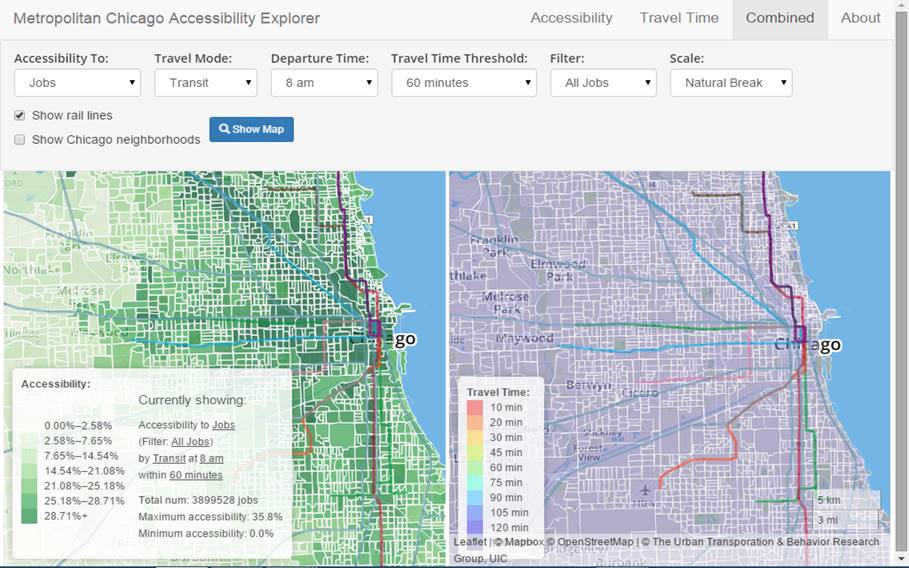The Urban Accessibility Explorer is an easy-to-use mapping system that measures the number of activities that can be reached by residents of specified neighborhoods within a given amount of travel time, by a particular mode and time of day.

(Updated 04/16/2015) The Metropolitan Chicago Accessibility Explorer is an easy-to-use mapping system that measures the number of activities, including various types of jobs, schools, parks, stores and libraries, that can be reached by residents of specified neighborhoods within a given amount of travel time, by a particular mode and time of day in the Chicago Metropolitan area. The results are displayed on maps that can be adjusted by scale and area. The Accessibility Explorer was developed by the Urban Transportation Center, which is a unit of the College of Urban Planning and Public Affairs at the University of Illinois at Chicago help policy makers, planners, and the general public easily evaluate how transportation system and land use change could alter accessibility.

This is an example of a new class of accessibility-based mapping tools, which also includes WalkScore and TransitScore, and the Access To Jobs Mapping System developed by the Regional Planning Association in the New York City region.
These tools help apply accessibility-based planning, which recognizes that the ultimate goal of most transport activity is access to goods and services, and that many factors can affect accessibility including the convenience, speed, and affordability of travel by various modes, transport network connectivity, land use density, and mix, and mobility substitutes such as telecommunications and delivery services.
(The post was updated to give proper credit to the developers of the app.)
FULL STORY: Metropolitan Chicago Accessibility Explorer

Planetizen Federal Action Tracker
A weekly monitor of how Trump’s orders and actions are impacting planners and planning in America.

Chicago’s Ghost Rails
Just beneath the surface of the modern city lie the remnants of its expansive early 20th-century streetcar system.

Study: Anti-Homelessness Laws Don’t Work
Research shows that punitive measures that criminalized unhoused people don’t help reduce homelessness.

The French Solution to Congested Tunnels: Make Them Car-Free
Bay Area transportation officials keep expanding car capacity. Lyon’s Croix Rousse Tunnel offers a different way.

Missouri Governor Reverses Anti-Discrimination Housing Policies
A new state law bars cities from prohibiting source-of-income discrimination against tenants using Section 8 housing vouchers.

USDOT Launches Unfunded 'SAFE ROADS' Program
The program targets “distractions” and “political messages or artwork,” and paves the way for autonomous vehicles.
Urban Design for Planners 1: Software Tools
This six-course series explores essential urban design concepts using open source software and equips planners with the tools they need to participate fully in the urban design process.
Planning for Universal Design
Learn the tools for implementing Universal Design in planning regulations.
City of Fort Worth
planning NEXT
Mpact (founded as Rail~Volution)
City of Camden Redevelopment Agency
City of Astoria
City of Portland
City of Laramie




























